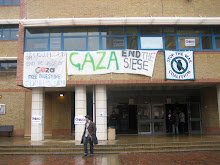
Taken from Victoria Brittain's article in the Guardian, Wednesday, Dec 9th, 2009: http://www.guardian.co.uk/commentisfree/cif-green/2009/dec/09/gaza-children-palestinian-babies
Among all the complex and long-term solutions being sought in Copenhagen for averting environmental catastrophe across the world, there is one place where the catastrophe has already happened, but could be immediately ameliorated with one simple political act.
In Gaza there is now no uncontaminated water; of the 40,000 or so newborn babies, at least half are at immediate risk of nitrate poisoning – incidence of "blue baby syndrome", methaemoglobinaemia, is exceptionally high; an unprecedented number of people have been exposed to nitrate poisoning over 10 years; in some places the nitrate content in water is 300 times World Health Organisation standards; the agricultural economy is dying from the contamination and salinated water; the underground aquifer is stressed to the point of collapse; and sewage and waste water flows into public spaces and the aquifer.
The blockade of Gaza has gone on for nearly four years, and the vital water and sanitation infrastructure went past creaking to virtual collapse during the three-week assault on the territory almost a year ago.
What would it take to start the two UN sewerage repair projects approved by Israel; a UN water and sanitation project, not yet approved; and two more UN internal sewage networks, not yet approved? Right now just one corner of the blockade could be lifted for these building materials and equipment to enter Gaza, to let water works begin and to give infant lives a chance. Just one telephone call from the Israeli defence ministry could do it – an early Christmas present to the UN staff on the ground who have been ready to act for months and have grown desperate on this front, as on so many others.
Earlier this year, just one question face to face to the Israeli government, from Senator John Kerry after he visited Gaza, allowed pasta into Gaza. Who from Europe or the US will ask the Israeli defence minister the face-to-face question for the blue babies? Sarah Brown, the British prime minister's wife, would be the perfect candidate – an independent person who has the ear of the powerful, a mother who knows something about grief for babies. And she could be accompanied by Lord Mandelson in case there was any bullying.
The science on all this is unchallenged. Last September a UN report spelled it out in stark detail, including the regional implications for Israel and Egypt if the shared aquifer is not "rested" and alternative water sources found. The United Nations Environment Programme estimated that $1.5bn could be needed over 20 years to restore the aquifer, including the establishment of desalination plants to take the pressure off the underground water supplies.
Gaza's huge pale sandy beaches used to be society's playground and reassurance of happiness and normality, with families picnicking, horses exercising, fishermen mending their nets, children swimming and boys exercising in the early morning, but these days they are mainly empty, and not just because it is winter. Between 50m and 60m litres of untreated sewage have flowed into the Mediterranean every day this year since the end of the Israeli invasion in January, the sea smells bad and few fish are available in the three nautical mile area Palestinians are allowed in. This resource seems as ruined as the rubble of Gaza's parliament and ministries.
A visitor to Gaza could miss this underground disaster, seeing what the surreal economy of the tunnels from Egypt has brought in: a chic new coffee house, with new furniture and prints on the wall, which would not be out of place in Piccadilly, fish from Oman for restaurants, fat sheep and goats for the Eid feast, new cars reassembled after being cut into four, huge motorbikes straight out of Easy Rider, bustling markets full of foods, clothes, fridges, washing machines, pharmaceuticals, some brought in to order, and much more. Some people are getting very rich on both sides of the Rafah border.
But the tunnels are a small slice of the reality. "We have run out of words to describe how bad it is here," says John Ging, director of operations for the United Nations Relief and Works Agency in Gaza. Ging heads a team of 10,000 mainly Palestinian workers who run the aid supplies that are all that stand between the vast majority of Gazans and destitution. "We have 80% unemployment, an economy at subsistence level, infrastructure destroyed, etc, but even worse than the humanitarian plight is the destruction of civil society."
Ging's great preoccupation is "the 750,000 children susceptible to an environment where things are moving rapidly in the wrong direction, where the injustice is bewildering, and every day worse".
There is a big problem of insecurity and violence here, and it is getting worse. Most adults display stoic resilience, and cling to a belief in traditional values, but there is a compelling narrative by extremists which becomes ever more difficult to combat. Only lifting the siege would change the dynamic.
An international community that has accepted the "normalcy" of the degrading tunnel economy for Gaza, shames us all. Ending the water emergency should be the first step to breaking the blockade.
(Taken from Victoria Brittain's article in the Guardian, Wednesday, Dec 9th 2009 : http://www.guardian.co.uk/commentisfree/cif-green/2009/dec/09/gaza-children-palestinian-babies)

http://www.dutchrainmaker.nl
ReplyDelete